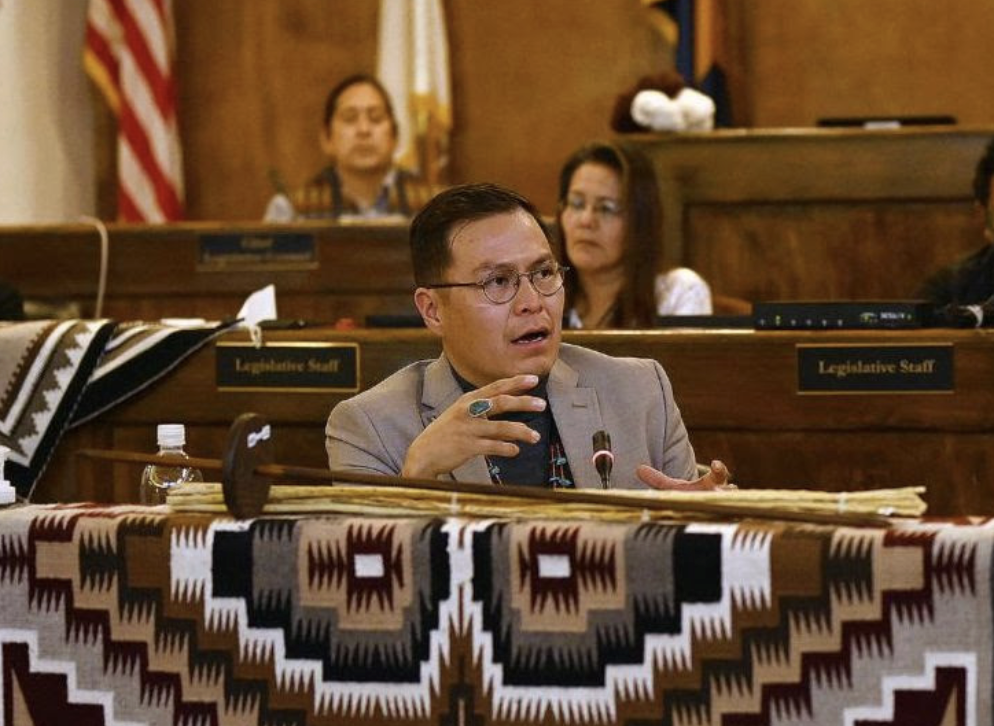
- Details
- By Native News Online Staff
The 25th Navajo Nation Council took a historic step Tuesday by approving amendments to formally recognize and establish Agency Veterans Organizations (AVO) and Chapter Veterans Organizations (CVO) under Title 2 of the Navajo Nation Code.
The measure, sponsored by Council Delegate Dr. Andy Nez, codifies the structure and authority of veterans’ organizations across all Navajo agencies and chapters. The new law allows these groups to develop official plans of operation and ensures their inclusion in the Navajo Nation Veterans Administration (NNVA) and Veterans Advisory Council (VAC) activities and advocacy.
Legislation No. 0168-25 amends the Navajo Nation Veterans Act to strengthen the organizational framework, representation, and accountability of veterans’ advocacy throughout the Nation. The law formally recognizes one AVO per agency and one CVO per chapter, creating a total of 110 chapter-level organizations. These entities will form a unified network to improve communication, advocacy, and coordination of veterans’ issues from the local to national level.
Under the amendments, the Veterans Advisory Council will be restructured to include ten members—one male and one female representative from each of the five agency veterans’ organizations. Each representative must be nominated through agency resolutions and provide documentation of honorable military service. This new structure aims to ensure gender balance and inclusive representation among those who have served.
An additional amendment introduced by Council Delegate George Tolth requires the Veterans Advisory Council to adopt bylaws and a code of conduct by the end of the second quarter of FY2026. These documents will establish professional standards for VAC members, define procedures for disciplinary action or removal, and set rules governing meetings and operations.
The legislation mandates quarterly written and in-person reports from the veterans’ organizations to the Navajo Nation Council and the NNVA Executive Director. These reports will help track veterans’ needs, identify service gaps, and recommend strategies to improve program delivery across the Nation.
The proposal received broad support from the Northern, Eastern, Western, Fort Defiance, and Central Agency Veterans Organizations, along with the Veterans Advisory Council and the NNVA. Supporters said the legislation strengthens the foundation of veterans’ representation and enhances advocacy efforts for veterans, surviving spouses, and Gold Star Mothers.
Members of the Council commended Dr. Nez for his leadership and collaboration with veterans’ groups throughout the legislative process.
Legislation No. 0168-25 passed with a vote of 17 in favor and six opposed. The 25th Navajo Nation Council serves as the final authority for the legislation.
More Stories Like This
50 Years of Self-Determination: How a Landmark Act Empowered Tribal Sovereignty and Transformed Federal-Tribal RelationsTunica-Biloxi Chairman Pierite Elected President as Tribal Nations Unite Behind New Economic Alliance
NCAI, NARF Host Session on Proposed Limits to Federal Water Protections
“Our Sovereignty Is Not Optional”: Tulalip Responds to ICE Actions
Denied Trip to Alcatraz, Leonard Peltier Tells Sunrise Gathering: “My Heart Is Full”
Help us defend tribal sovereignty.
At Native News Online, our mission is rooted in telling the stories that strengthen sovereignty and uplift Indigenous voices — not just at year’s end, but every single day.
Because of your generosity last year, we were able to keep our reporters on the ground in tribal communities, at national gatherings and in the halls of Congress — covering the issues that matter most to Indian Country: sovereignty, culture, education, health and economic opportunity.
That support sustained us through a tough year in 2025. Now, as we look to the year ahead, we need your help right now to ensure warrior journalism remains strong — reporting that defends tribal sovereignty, amplifies Native truth, and holds power accountable.
 The stakes couldn't be higher. Your support keeps Native voices heard, Native stories told and Native sovereignty defended.
The stakes couldn't be higher. Your support keeps Native voices heard, Native stories told and Native sovereignty defended.
Stand with Warrior Journalism today.
Levi Rickert (Potawatomi), Editor & Publisher


